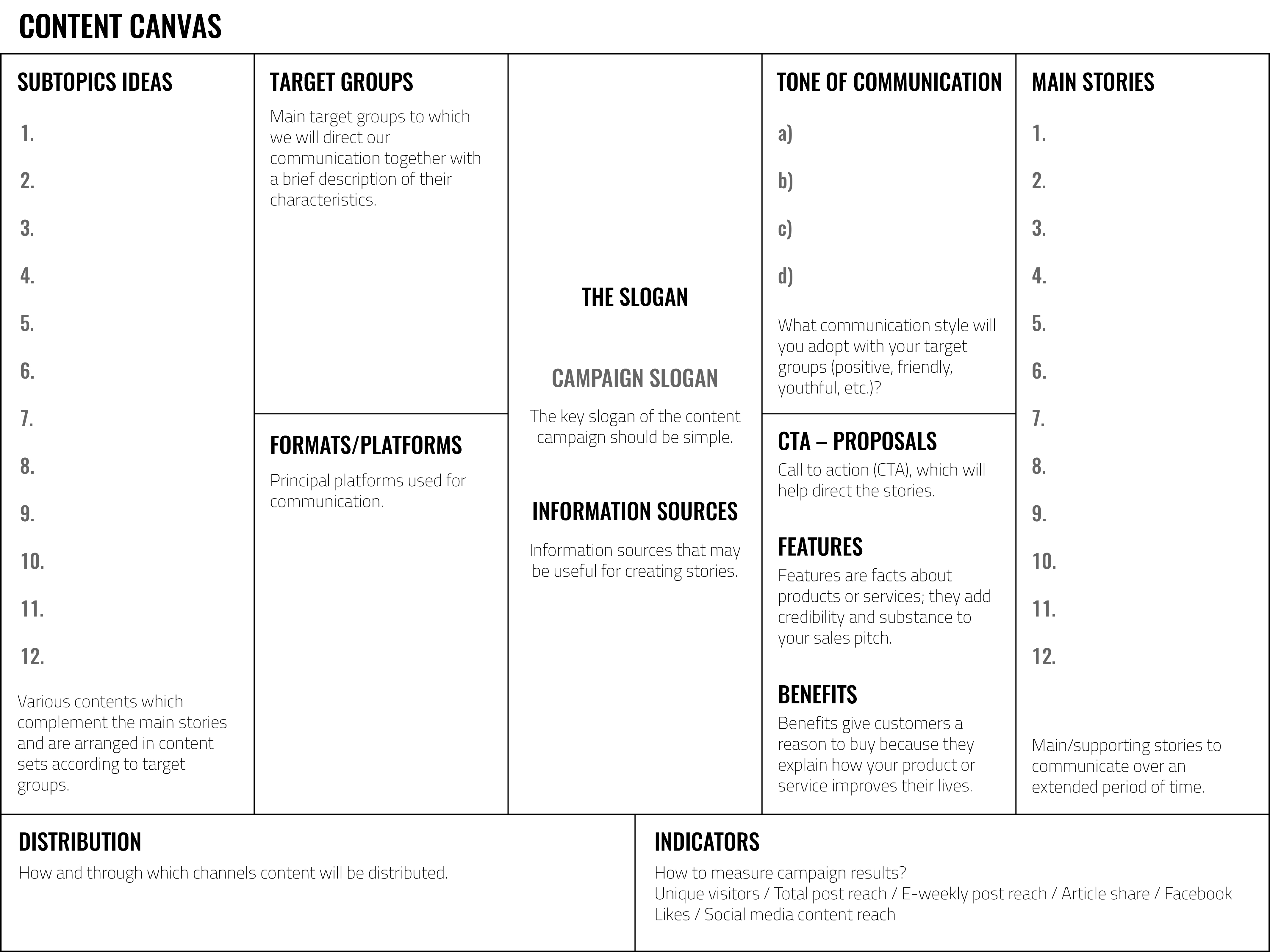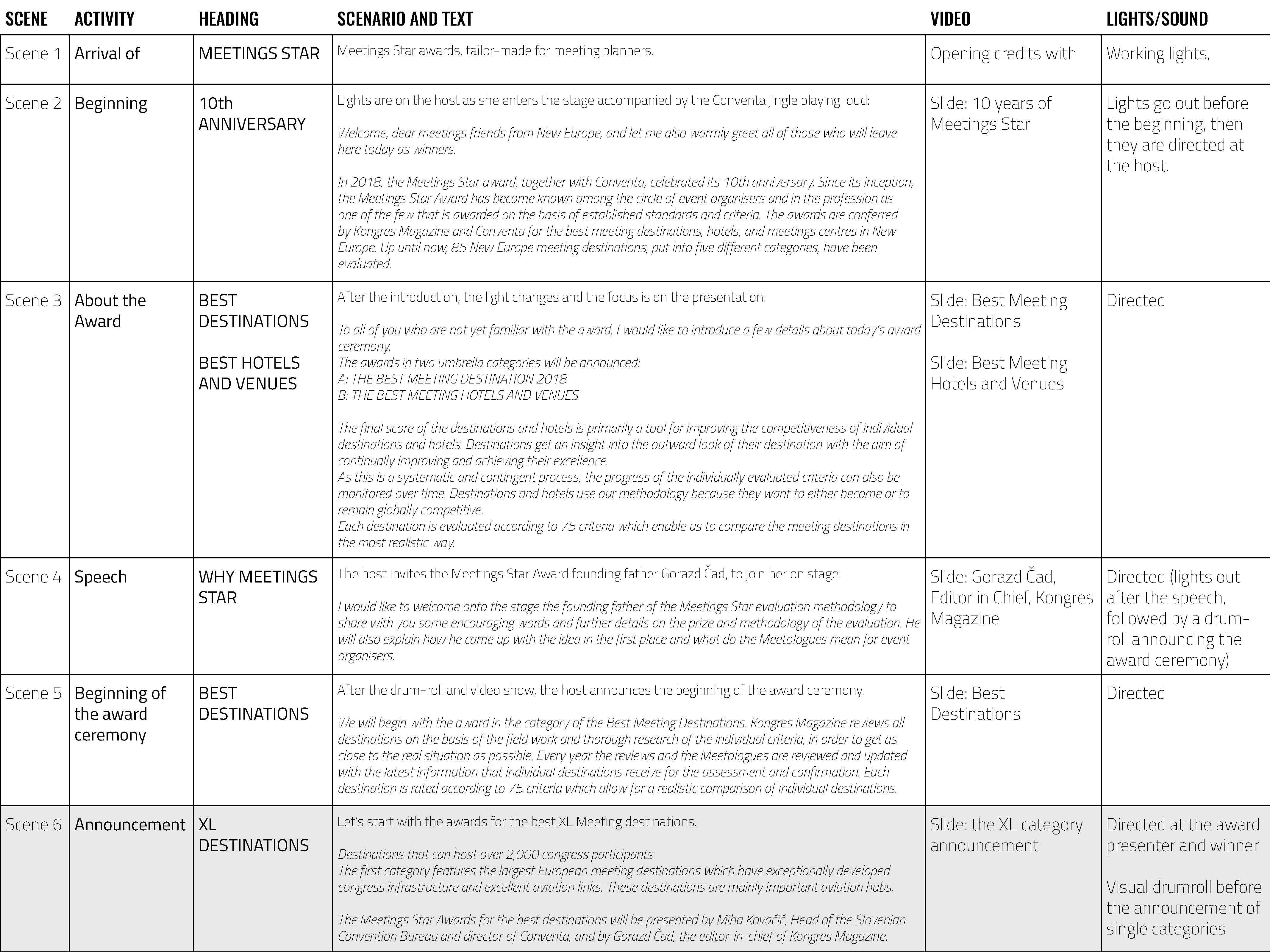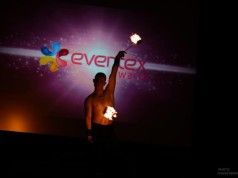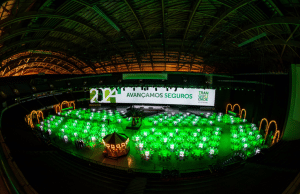DEFINITION
In this day and age, to create opportunities and impress people we mostly turn to digital platforms. These platforms, however, are hungry for good stories and high-quality content marketing. I like to say that the digital beast is tremendously hungry for good content. Today, content marketing has to be included in every marketing process, especially the event organisation. Good content is essential to the success of your event.
THE STARTING POINT
In my opinion, excellent events go hand in hand with good stories. When explaining to my children what good music means to me, I always talk about good, intelligent, vivid lyrics. Lyrics that criticise, are lucid and at the same time poetic. It is the heart that counts the most. But the easiest way to explain this to them is through fairy tales. Here’s the listener and there’s the story and its narrator: no distracting noises and props in between. I’m certain that storytelling is the most efficient communication mechanism which enables us to build a relationship with event participants. What’s more, such an approach will stick in their minds and, if the story is really good, in their hearts as well. Indeed, events have been the best storytelling medium since the dawn of time.
THE CONCEPT
As event organisers, we have to give our clients and event participants good stories. We have to educate our audience and constantly provide them with only the best of what there is. Congress stories are in their nature urban, hip and rock. Just look at the top meeting destinations, and you’ll see. Nothing beyond urban-polis, which is where most of your and our meeting participants come from as well. Unfortunately, such stories often remain unheard due to the stereotypical pop culture, which, thanks to media pressure, also prevails among meeting participants. An interesting comparison arises at the mention of music and the meetings industry. As soon as industries are brought into the conversation, there seems to be an abundance of good stories. But in reality, good stories are (too) scarce in both industries. Just think about how many silly lyrics you have heard recently and how many average, barely fun events you have attended.
The fact is that storytelling is an indispensable and wonderful way to attract participants, connect with them and establish long-term relationships. To this end, you should use all available channels.
Once your event becomes synonymous with a good story, people will identify with it easier and quicker and the event will become contagious. In doing that, there are, however, many challenges to consider. The most important is to test the relevance of your story against your target group. You have to know your target group very well and have a detailed understanding of all their needs, which requires a lot of hard work and investments. Those who learnt that a long time ago, today manage their own communication channels to present their stories, which has earned them the biggest advantage.


Why is it then that content marketing is crucial to event organisers?
1. A good event brief requires excellent content marketing
When drafting a brief, you will need to employ all content-marketing elements. The success of the brief largely depends on how the event story is written and presented. This requires an enormous amount of knowledge, team work, and content-marketing expertise.
2. Preparing offers and event pitches entail the use of content marketing on a daily basis
In reality, you deal with content marketing every single day when you respond to enquiries and RFPs. Successful offers provide answers to the classic “problem – benefit – opportunity” challenge. You story may be successful without a knowledge of content marketing, but with it your client will realise that you’re able to solve their problem, that they will benefit from you, and that they may miss out if they don’t take the opportunity.
3. Good scenarios are based on extraordinary stories
The essence of every event is the story that you wish to tell and constitutes the scenario for the event. To make an interesting scenario, you need drama, conflicts or contradictions between characters, and strong emotions. Events are not like books or radio, at best they’re like films which can serve as a source of inspiration and knowledge for how to best present a story in pictures and words.
4. The event world is composed of stories
Recognition is the key competitive advantage to have in a world of countless events. If we fail to distinguish ourselves from the others, participants don’t have the chance to recognise us as the right choice for them. And we can only stand out with the help of high-quality targeted stories. If you don’t know and understand your target group, you’ll have trouble reaching your goal. But before that, you have to find answers to who are you in the universe of events and what kind of story you tell.
5. You have to know how to tell a story about yourself
Today, only a small fraction of original stories capture our attention. We only devote our attention to things that we benefit from and those that entertain us. Content marketing helps us create stories which are important to participants, who as a result, reward us with loyalty and event attendance. If we don’t tell the stories, they will! And not necessarily positive ones. Once you connect stories with successful sales, you’re on the road to success.
6. High-quality content is the digital Trojan Horse
Can you imagine an event promotion without a good website? But a website isn’t enough. You also have to use search engine optimisation (SEO) to make it visible. Every search engine follows its own rules to listing search results, but what they all have in common is that they reward good and relevant content. This is currently the most dynamic area of content marketing, where you can easily jeopardise your search engine and meetings market position if you lack appropriate knowledge.

7. Social media as a catalyst of your congress stories
Social media and content marketing are the winning combination today. You’ll raise awareness of your event through social media. At the same time, you’ll use them to direct participants to additional content on your website. Furthermore, social media boast viral potential which can serve as a strong indicator that your event is trustworthy. You can achieve this with various content-marketing tools, from informative articles, webinars, demo videos, case studies addressing good practices, to white papers. Professional profiles from the field of content distribution, such as photographers, graphic designers, video producers, and journalists are key to the success of content distribution via social media.
8. When it comes to contacts, more is more
True and authentic stories are the pillar to your sales. Such stories namely give rise to a positive reaction which then translates into an active participant base. The conversion of the content into the base of potential customers is the foundation stone of direct marketing and sales. In view of that, the golden rule of sales should be, that building up the potential customer base comes first and foremost. You should spend much more time identifying the target group that best fits your story. In doing that, quality should be put before quantity. It is the potential customers who express interest and we can only get through to them with appropriate content.
9. Content is the asset of your event
Good content is the communication asset of your event. Think about the content and programmes that you have developed and maybe even put under copyright protection. This is a kind of seed capital that may bear rich fruit but may also be completely useless if you don’t provide for adequate content distribution. The best event organisers take content distribution matters into their own hands, becoming new editors in charge of participants’ satisfaction and high-quality attractive content.
10. Can you still afford not to use content marketing?
In the past, we got by just fine with a simple website. Today, it is important to ensure a comprehensive user experience on all channels. Think about what powers the latter-day mix which leads to sales events. High-quality content powers your landing page, Facebook profile, YouTube channel, corporate magazine, call centre, digital campaign, newsletter, direct marketing, and your events.

RECOMMENDATIONS
First and foremost, good stories have to have credibility. But they also have to be useful. Never sensationalistic. Through good content we offer meeting participants the possibility to interact and co-create the event. And this is the essence of today’s story. Whatever picture you may have painted in your mind as a meeting organiser, your story will be co-created by participants and you should subject your communication, technology, and contemporary event organisation to this. We need to realise that nothing can be sold to participants in bulk amounts. Rome wasn’t built in a day, and this is especially true when building meeting stories.
At the same time, being infatuated in your own models and resisting new knowledge is a deadly sin. The power of content marketing namely arises from its ability to put itself in the shoes of meeting participants, understanding them and offering them the right solutions at the right time.
INSPIRATION
One example of events which are based on excellent content are TED conferences (Technology Entertainment and Design). The beginning of this story dates back to 1984, when architect Richard Saul Wurman organised the first four-day event in California. The distinctive feature of these events was the format of the presentations which were limited to 18 minutes and which were democratically made available after the event to everyone, regardless of the fact that the speaker structure included influencers from various fields. TEDx events are organised locally and governed by licences. Their content covers a wide range of themes from the fields of science, art, politics, global issues, architecture, music and other areas.
It is the simple idea and format, along with strict and in-depth work with speakers, that make for the success and constant quality of these events. The speakers, who are selected by a strict group of organisers based on prior selection and rehearsal, are extremely well-prepared and generally present attractive stories. In the last 35 years, the event has become a global movement and an example of good practice for event organisers in general.
www.ted.com
Example 1: Content Canvas

Example 2: Event Scenario















